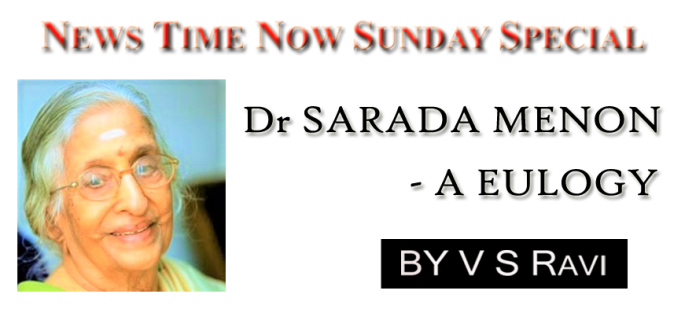Like probably thousands of people in Chennai, I received a few days ago the shocking news of the demise of Dr.Sarada Menon, India’s pre-eminent psychiatrist at the ripe old age of 98. Of course her death was not totally unexpected, considering her advanced age, and the pneumonia that had ravaged her frail lungs for the last two Weeks. But still when the end came the news hit me like a sledge-hammer.
One cannot sum up the life, achievements, fantastic career and the nobility of her character in a small paragraph or even in a few pages. I shall therefore outline briefly her great qualities, for she had absolutely no flaws.
She hailed from one of the most illustrious families of Kerala. She had a brilliant academic career, in school and college and later on as a medical student in Madras Medical college Madras.
By the early 60s she had reached the pinnacle of her profession Her rise in her profession was meteoric, bordering on the romantic. Having reached the top of her profession she retained that position for several decades well into the first decade of this century. Only in the last decade, she slowed down a bit, but even then she was seeing some patients by sheer force of habit, as treating the mentally sick was her raison d’être.
I had first met her in December 1963. At that stage in my life, I had been unable to decide whether I should continue to remain in the Indian Police service as desired by my parents or go to Cambridge University or Oxford to study English literature in which I was passionately interested. My cousin Rama who herself was a brilliant medical student knew about Dr, Sarada Menon’s reputation as an eminent psychiatrist as well a counsellor who could help students with personal and work problems. She advised my parents to seek the opinion of Sarada Menon. She even took the imitative and introduced all three of us to her.
Sarada Menon advised me to pursue my career in the police while at the same time retaining my interest in English literature, a piece of sound advice which I followed.
She had a room in her own house which she had set apart for seeing her patients. She allowed one adult to accompany a patient to her room. She respected the privacy of her patient. She never discussed the ailments of her patients with anyone else.
She had patients who belonged to all walks of life. Many distinguished persons came to see her, seeking medical assistance or advice in respect of some personal matter.
She never made a patient feel that he was taking too much of her time. Unlike as is the case with all other physiological ailments, a psychiatrist has the singular disadvantage of having to arrive at a correct diagnosis without the aid of any diagnostic tool. He has to make a diagnosis on the basis of the symptoms described by the patient and his or her guardian. He has to have immense patience in order to be able to listen to a patient for a long interval of time in sharp contrast to the 15 or 20 minutes by a physician treating any physical ailment. Dr Sarada Menon possessed this quality in abundant measure.
During the sixties, tranquillisers antidepressants, Tricyclic antidepressants and Serotonin Reuptake inhibitors were unknown, and she had to depend on a few sedatives, and on her own skill at counselling. Still she succeeded in treating her patients effectively.
Of course after the above mentioned three categories of drugs came into the market, she quickly familiarised herself with their properties, usage and dosage.
During my long association of 57 years, I would have seen her at least a hundred times. She treated me as her own son. I have never heard her speak ill about anyone or comment unfavourably about any unpleasant development or unpleasant situation. I have never come across a person with such a positive attitude in life.
Her loss is irreparable to her colleagues, to thousands of patients, and the younger generation of aspiring psychiatrists, to whom she was an inspiration. She was awarded the Padma Bhushan which I feel is not a fitting recognition considering her stature as the most distinguished Psychiatrist this country has ever known.
She was an extraordinary person. I have never come across a nobler human being.
Just behind where she sat everyday, there is, on top of the wall, a plaque, which contains the following words
” I expect to pass through life
but once. If therefore, there be
any kindness I can show, or any
good thing I can do to any
fellow being, let me do it now,
and not defer or neglect it, as I
shall not pass this way again.”
Sarada Menon was the only person who followed this message throughout her life.


















































